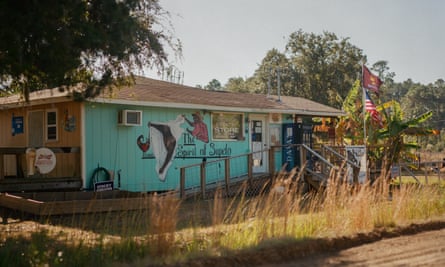Community of Gullah-Geechee people in Georgia protest vote for lifting protective laws, threatening a 230-year-old heritage
Edwin Rios
THE GUARDIAN
Wed 13 Sep 2023
For more than 230 years, a small community of Gullah-Geechee people have called Sapelo Island off the coast of Georgia home. Hogg Hammock, the area on the island where these descendants of enslaved people live, is a 427-acre coastal community of 40 residents and has been designated as a historic site since 1996. That means that the construction of houses more than 1,400 sq ft and any road paving or demolition of property are strictly prohibited to preserve the island community.
On Tuesday, McIntosh county commissioners, who preside over Sapelo, voted to remove zoning restrictions in Hogg Hammock. Gullah-Geechee residents fear that wealthy transplants who want to develop larger homes and who could force a rise of property taxes there will displace them and upend their livelihoods.
The county, which is 65% white, has voted to remove official language that acknowledges Hogg Hammock as an area with “unique needs in regard to its historic resources”. It will also strike language that states it should prevent “land value increases which could force removal of the indigenous population”.
The vote represents the latest dispute between county officials and the small historic Black community. Back in 2012, Hogg Hammock residents protested against the county’s raising of property taxes – which the county then rolled back. And in 2015, the community sued the county in federal court alleging that it had racially discriminated against residents by failing to provide them with adequate services. The island’s residents had paid county taxes for schools, police and fire departments, and trash collection services – none of which extended to Sapelo Island. The county settled the lawsuit last year, agreeing to give emergency and road services and freeze property taxes for some residents.

Descendant homes on Sapelo Island. Teh community is fighting to protect against developers swooping in on their land. Photograph: Rita Harper/The Guardian
Last Thursday, dozens of residents gave hours of testimony to the county’s zoning board arguing against the proposed changes, warning that the county had hastily made changes without community consideration. Reginal Hall, a landowner whose family had roots in Hogg Hummock, told the Associated Press the county’s approval would amount to “the erasure of a historical culture that’s still intact after 230 years”.
Residents and state lawmakers called for the county to delay their vote and to reflect on proposed changes for 90 days. “We will not allow our cultural history to be erased or bought at the price of land developers,” the state representative Kim Schofield, who represents Atlanta, told reporters. “This is our history and our heritage, and we will fight to protect it.”
Last Thursday, dozens of residents gave hours of testimony to the county’s zoning board arguing against the proposed changes, warning that the county had hastily made changes without community consideration. Reginal Hall, a landowner whose family had roots in Hogg Hummock, told the Associated Press the county’s approval would amount to “the erasure of a historical culture that’s still intact after 230 years”.
Residents and state lawmakers called for the county to delay their vote and to reflect on proposed changes for 90 days. “We will not allow our cultural history to be erased or bought at the price of land developers,” the state representative Kim Schofield, who represents Atlanta, told reporters. “This is our history and our heritage, and we will fight to protect it.”
Hall warned the county’s vote to remove development limits would give Gullah -Geechee residents in Hogg Hammock just “two to three years at most” to survive in the county before they scatter elsewhere, as 200,000 Gullah-Geechee people have already done across the south-eastern corridor of the United States. “If you talk about the descendants of the enslaved,” she said, “90% of us will be gone.”

No comments:
Post a Comment